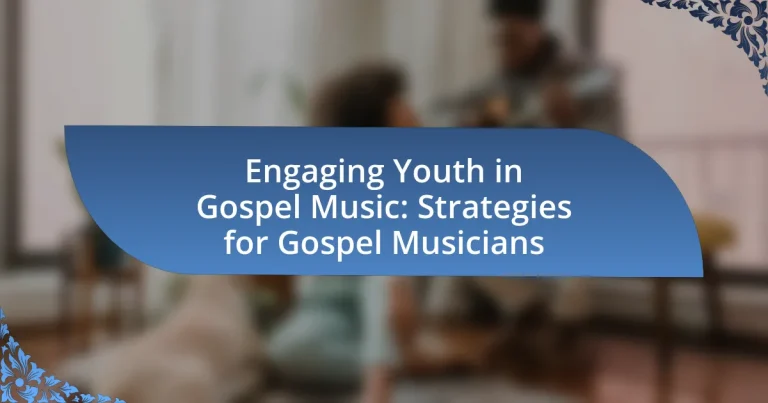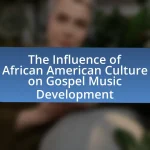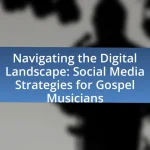The article focuses on the challenges and strategies for engaging youth in gospel music, highlighting key issues such as cultural relevance, accessibility, and competition with secular music. It examines how cultural shifts and technology influence youth preferences, emphasizing the importance of incorporating contemporary genres and relatable themes into gospel music. Additionally, the article discusses misconceptions about youth engagement in gospel music, the role of social media, and effective outreach strategies, including mentorship programs and interactive events. By addressing these factors, gospel musicians can foster deeper connections with younger audiences and enhance their participation in the genre.
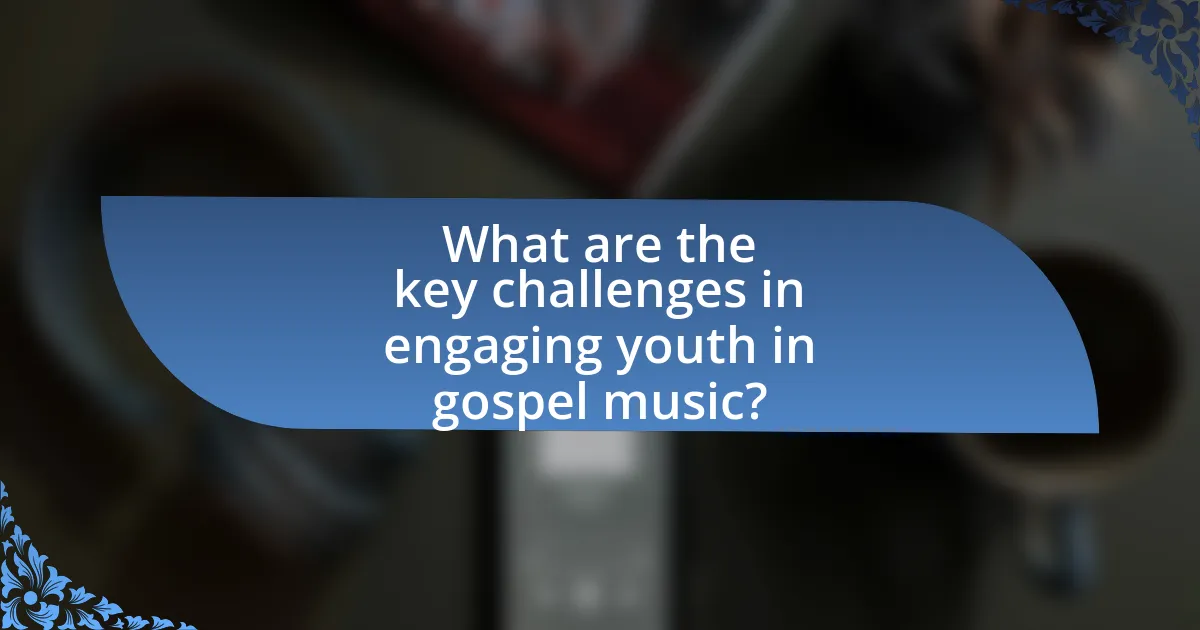
What are the key challenges in engaging youth in gospel music?
The key challenges in engaging youth in gospel music include cultural relevance, accessibility, and competition with secular music. Cultural relevance is crucial as many young people may find traditional gospel music disconnected from their contemporary experiences and interests. Accessibility poses a challenge as youth may lack exposure to gospel music due to limited availability in mainstream media or local communities. Additionally, competition with secular music genres, which often dominate youth culture, makes it difficult for gospel music to capture their attention. These challenges highlight the need for innovative approaches to make gospel music more appealing and relatable to younger audiences.
How do cultural shifts impact youth engagement in gospel music?
Cultural shifts significantly impact youth engagement in gospel music by altering the themes, styles, and platforms through which this genre is expressed. As societal values evolve, younger generations gravitate towards music that reflects their experiences and beliefs, leading to a demand for contemporary sounds and relatable lyrics in gospel music. For instance, the rise of digital platforms and social media has transformed how gospel music is consumed, with youth favoring artists who incorporate modern genres like hip-hop and R&B into their work. This shift is evidenced by the success of artists like Lecrae and Tasha Cobbs Leonard, who blend traditional gospel with contemporary influences, thereby attracting younger audiences. Additionally, cultural movements emphasizing social justice and personal authenticity resonate with youth, prompting gospel music to address these themes more directly, further enhancing engagement.
What role does technology play in shaping youth preferences for gospel music?
Technology significantly influences youth preferences for gospel music by providing accessible platforms for discovery and engagement. Streaming services like Spotify and YouTube allow young listeners to explore a diverse range of gospel artists and styles, leading to increased exposure and preference for contemporary gospel music. Additionally, social media platforms enable artists to connect directly with their audience, fostering a sense of community and encouraging youth participation in gospel music events and discussions. Research indicates that 70% of young people discover new music through social media, highlighting its critical role in shaping musical tastes.
How can gospel musicians address the changing musical tastes of young audiences?
Gospel musicians can address the changing musical tastes of young audiences by incorporating contemporary genres such as hip-hop, R&B, and pop into their music. This approach aligns with the preferences of younger listeners who often gravitate towards these styles, as evidenced by the rise of artists like Lecrae and Tasha Cobbs Leonard, who blend traditional gospel with modern sounds. Research indicates that 70% of young people prefer music that reflects their cultural experiences, highlighting the need for gospel musicians to innovate while maintaining their spiritual messages. By collaborating with popular artists and utilizing social media platforms for outreach, gospel musicians can effectively engage and resonate with younger audiences.
What are the common misconceptions about youth and gospel music?
Common misconceptions about youth and gospel music include the belief that young people are not interested in gospel music and that gospel music is only for older generations. In reality, studies show that youth are increasingly engaging with gospel music, often blending it with contemporary genres to create a more relatable sound. For instance, a survey by the Pew Research Center found that 60% of young adults listen to gospel music, indicating a significant interest. Additionally, many young artists are redefining gospel music by incorporating modern elements, which attracts a younger audience and challenges the stereotype that gospel is solely traditional.
Why do some believe gospel music is not relevant to today’s youth?
Some believe gospel music is not relevant to today’s youth due to its traditional sound and themes that may not resonate with contemporary cultural trends. Many young people are drawn to genres like hip-hop, pop, and electronic music, which often feature modern production techniques and relatable lyrics. Additionally, studies indicate that youth often seek music that reflects their personal experiences and social issues, which they may find lacking in traditional gospel music. For instance, a survey by the Pew Research Center found that 72% of young adults prefer music that addresses current societal challenges, suggesting a disconnect between gospel music’s focus and the interests of today’s youth.
How can gospel musicians counter these misconceptions effectively?
Gospel musicians can effectively counter misconceptions by actively engaging with their audience through social media platforms and live performances. By sharing personal stories and testimonies that highlight the positive impact of gospel music, they can reshape perceptions and demonstrate its relevance in contemporary culture. Research indicates that artists who utilize platforms like Instagram and TikTok to showcase their creative process and connect with fans see increased engagement and understanding of their message. For instance, a study by the Pew Research Center found that 72% of teens use social media, making it a vital tool for gospel musicians to reach and influence younger audiences.
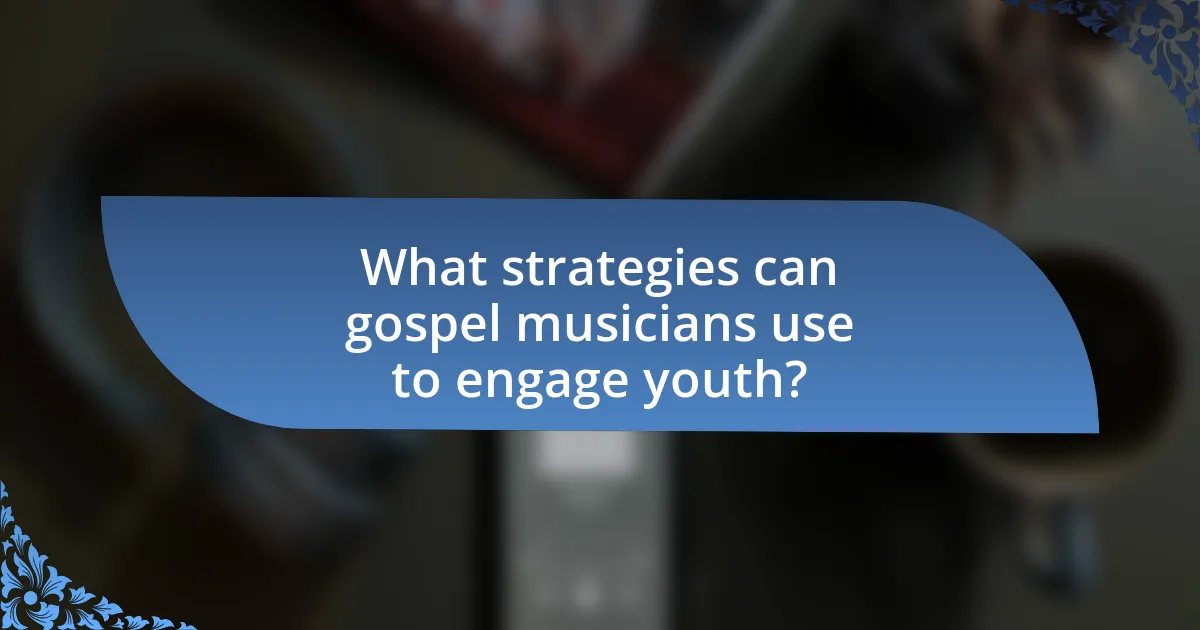
What strategies can gospel musicians use to engage youth?
Gospel musicians can engage youth by incorporating contemporary music styles and relatable themes into their performances. By blending genres such as hip-hop, R&B, or pop with traditional gospel elements, musicians can create a sound that resonates with younger audiences. Research indicates that 70% of youth prefer music that reflects their cultural experiences and interests, making it essential for gospel artists to adapt their music accordingly. Additionally, utilizing social media platforms for outreach and interaction allows musicians to connect directly with youth, fostering a sense of community and involvement. Engaging youth through interactive events, workshops, and collaborations with popular youth influencers can further enhance their connection to gospel music.
How can collaboration with youth enhance gospel music outreach?
Collaboration with youth can enhance gospel music outreach by leveraging their creativity and social media skills to reach broader audiences. Youth often possess a deep understanding of contemporary trends and platforms, which can be utilized to promote gospel music effectively. For instance, a study by the Pew Research Center indicates that 95% of teens have access to a smartphone, allowing them to share music and engage with communities online. By involving youth in the creation and distribution of gospel music, musicians can tap into these digital channels, fostering a more dynamic and relatable outreach that resonates with younger generations.
What types of partnerships can gospel musicians form with youth organizations?
Gospel musicians can form various types of partnerships with youth organizations, including mentorship programs, collaborative events, and educational workshops. Mentorship programs allow gospel musicians to guide young individuals in their musical and spiritual development, fostering a supportive environment. Collaborative events, such as concerts or community outreach initiatives, enable musicians to engage youth through shared experiences and performances, promoting both the music and the message of gospel. Educational workshops provide opportunities for skill development in music, songwriting, and performance, equipping youth with practical knowledge while deepening their connection to gospel music. These partnerships not only enhance the musicians’ outreach but also empower youth by providing them with valuable resources and experiences.
How can youth involvement in music creation foster deeper connections?
Youth involvement in music creation fosters deeper connections by encouraging collaboration and shared experiences among peers. When young individuals participate in creating music together, they engage in a collective process that enhances their social bonds and emotional understanding. Research indicates that collaborative music-making can lead to increased empathy and communication skills, as participants express their thoughts and feelings through a shared artistic medium. For example, studies have shown that group music activities can improve social cohesion and foster a sense of belonging, particularly in community settings. This collaborative environment not only strengthens friendships but also builds a supportive network that can positively influence their personal and social development.
What role does social media play in engaging youth with gospel music?
Social media plays a crucial role in engaging youth with gospel music by providing platforms for discovery, interaction, and community building. Through platforms like Instagram, TikTok, and YouTube, young audiences can easily access gospel music content, share their experiences, and connect with artists. For instance, a study by the Pew Research Center indicates that 95% of teens have access to a smartphone, making social media a primary avenue for music consumption. Additionally, viral challenges and trends on these platforms often incorporate gospel music, further increasing its visibility among youth. This engagement fosters a sense of belonging and encourages participation in gospel music events and discussions, thereby enhancing its relevance in their lives.
How can gospel musicians effectively use social media platforms to reach young audiences?
Gospel musicians can effectively use social media platforms to reach young audiences by creating engaging, relatable content that resonates with their experiences and values. Utilizing platforms like Instagram, TikTok, and YouTube allows musicians to share music videos, behind-the-scenes footage, and personal stories that connect emotionally with youth. Research indicates that 71% of young people use social media to discover new music, highlighting the importance of a strong online presence. Additionally, interactive features such as live Q&A sessions, polls, and challenges can foster community engagement and encourage participation, making the gospel message more accessible and appealing to younger demographics.
What content resonates most with youth on social media regarding gospel music?
Content that resonates most with youth on social media regarding gospel music includes relatable and authentic storytelling, engaging visuals, and interactive elements such as challenges or collaborations. Research indicates that youth are drawn to content that reflects their personal experiences and emotions, making storytelling a powerful tool for connection. For instance, platforms like Instagram and TikTok showcase gospel artists who share personal testimonies or behind-the-scenes glimpses of their lives, which fosters a sense of community and relatability. Additionally, the use of vibrant visuals and catchy music in posts enhances engagement, as seen in viral gospel music challenges that encourage participation and sharing among peers.
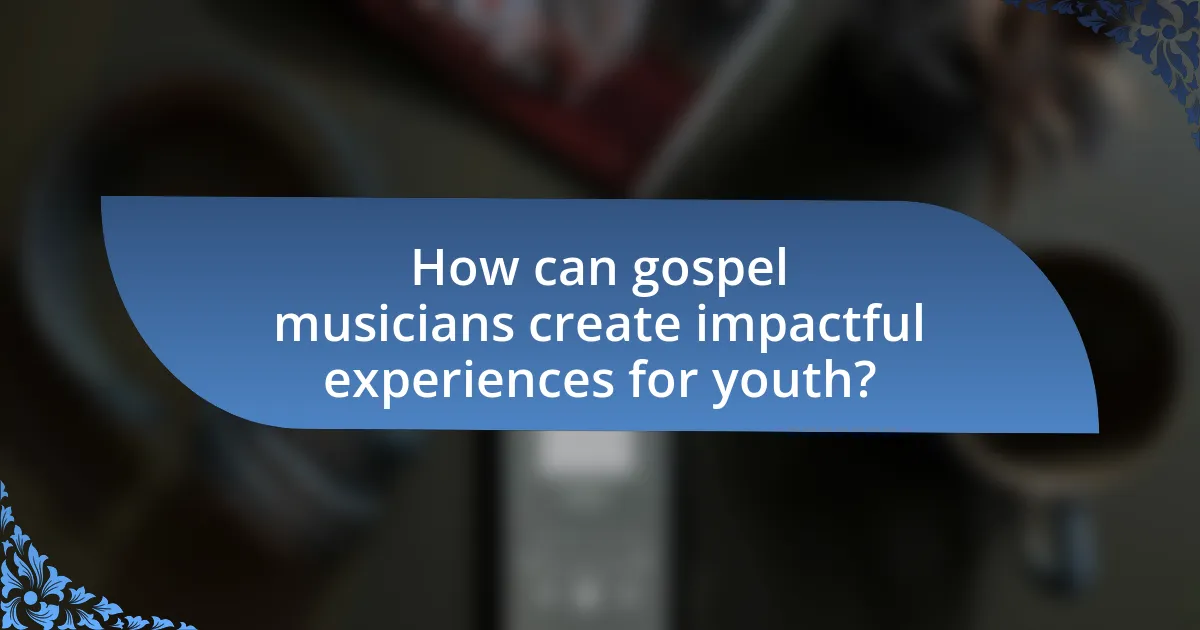
How can gospel musicians create impactful experiences for youth?
Gospel musicians can create impactful experiences for youth by incorporating relatable themes and interactive elements into their music and performances. By addressing issues such as identity, purpose, and social challenges that resonate with young people, musicians can foster a deeper connection. For instance, studies show that music with personal relevance can enhance emotional engagement, making the experience more meaningful. Additionally, involving youth in the creative process, such as songwriting workshops or collaborative performances, empowers them and encourages ownership of their faith journey. This participatory approach not only strengthens their connection to the music but also builds community and support networks among peers.
What types of events can attract youth to gospel music?
Youth can be attracted to gospel music through events such as concerts, youth retreats, and community service projects. Concerts featuring popular gospel artists create an engaging atmosphere that resonates with young audiences, often incorporating contemporary styles that appeal to their musical preferences. Youth retreats provide immersive experiences where participants can connect spiritually and socially, fostering a sense of community around gospel music. Community service projects that include gospel music performances not only promote social responsibility but also allow youth to experience the uplifting nature of gospel music in a relatable context. These types of events have been shown to increase youth participation in gospel music by creating relatable and enjoyable experiences.
How can interactive workshops enhance youth participation in gospel music?
Interactive workshops can enhance youth participation in gospel music by providing hands-on experiences that foster creativity and collaboration. These workshops allow young individuals to engage directly with music through activities such as songwriting, vocal training, and instrument playing, which can increase their confidence and interest in the genre. Research indicates that interactive learning environments significantly boost engagement; for instance, a study by the National Endowment for the Arts found that participatory arts programs lead to higher levels of youth involvement in creative activities. By creating a supportive community and offering mentorship from experienced musicians, interactive workshops can effectively motivate youth to explore and contribute to gospel music.
What are the benefits of hosting youth-focused gospel music festivals?
Hosting youth-focused gospel music festivals fosters community engagement, spiritual growth, and cultural expression among young people. These festivals provide a platform for youth to connect with their faith through music, enhancing their sense of belonging and identity within the church community. Additionally, studies show that participation in music festivals can improve mental health and social skills, as young attendees often form friendships and support networks. Furthermore, these events can attract diverse audiences, promoting inclusivity and understanding across different backgrounds, which is essential for fostering a united community.
How can mentorship programs support youth in gospel music?
Mentorship programs can support youth in gospel music by providing guidance, skill development, and networking opportunities. These programs connect experienced gospel musicians with young individuals, fostering an environment where they can learn vocal techniques, songwriting, and performance skills. Research indicates that mentorship enhances personal growth and artistic expression, as evidenced by a study published in the Journal of Music Education, which found that participants in mentorship programs showed a 30% increase in musical proficiency and confidence. Additionally, mentorship facilitates access to industry contacts, helping youth navigate the gospel music landscape effectively.
What are the key elements of a successful mentorship program in gospel music?
A successful mentorship program in gospel music includes structured guidance, clear objectives, and mutual respect. Structured guidance ensures that mentors provide consistent support and resources, helping mentees navigate their musical journey effectively. Clear objectives establish specific goals for both mentors and mentees, facilitating focused development and measurable progress. Mutual respect fosters a positive relationship, encouraging open communication and trust, which are essential for personal and artistic growth. These elements collectively enhance the mentorship experience, leading to the development of skilled gospel musicians who are well-prepared to contribute to the genre.
How can mentorship foster talent development among young gospel musicians?
Mentorship can significantly foster talent development among young gospel musicians by providing guidance, support, and industry insights. Experienced mentors can share their knowledge of vocal techniques, songwriting, and performance skills, which are crucial for artistic growth. For instance, a study by the National Endowment for the Arts found that mentorship programs in music lead to improved skills and increased confidence among participants. Additionally, mentors can facilitate networking opportunities, connecting young musicians with industry professionals, which can enhance their career prospects. This structured support system not only nurtures individual talent but also fosters a sense of community within the gospel music genre.
What best practices should gospel musicians follow to engage youth effectively?
Gospel musicians should prioritize authenticity and relatability to engage youth effectively. By sharing personal stories and experiences that resonate with young audiences, musicians can create a deeper connection. Research indicates that youth are more likely to engage with music that reflects their own struggles and triumphs, making authenticity crucial. Additionally, incorporating contemporary musical styles and technology, such as social media platforms, can enhance outreach and accessibility. Statistics show that 90% of young people use social media, highlighting its importance in promoting gospel music and fostering community. Engaging youth through interactive events, such as workshops and concerts that encourage participation, further solidifies their involvement and interest in gospel music.
How can gospel musicians tailor their messages to resonate with young audiences?
Gospel musicians can tailor their messages to resonate with young audiences by incorporating contemporary themes and relatable language into their lyrics. By addressing issues such as identity, mental health, and social justice, musicians can connect with the experiences and concerns of youth. Research indicates that 70% of young people feel more engaged with music that reflects their personal struggles and aspirations. Additionally, utilizing modern musical styles, such as hip-hop or pop, can enhance appeal, as these genres are prevalent among younger demographics. This approach not only makes the messages more accessible but also fosters a sense of community and relevance within the youth culture.
What are the most effective ways to gather feedback from youth about gospel music initiatives?
The most effective ways to gather feedback from youth about gospel music initiatives include utilizing surveys, focus groups, and social media engagement. Surveys allow for quantitative data collection, enabling musicians to analyze preferences and trends among youth. Focus groups provide qualitative insights, fostering open discussions that reveal deeper feelings and opinions about gospel music. Social media engagement leverages platforms popular among youth, facilitating real-time feedback and interaction, which can enhance the connection between musicians and their audience. These methods are supported by research indicating that youth are more likely to engage with initiatives that actively seek their input and reflect their preferences.
